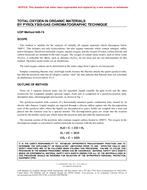Description
This method is suitable for the analysis of virtually all organic materials which decompose below 1000 degrees C. This includes not only hydrocarbons, but also organic materials which contain nitrogen, sulfur, and/or halogens. Dissolved molecular oxygen, organic oxygen, and the oxygen of water, carbon dioxide and carbon monoxide are included in the total oxygen. The oxygen of certain metal oxides, such as ferric oxide (Fe2O3), is reducible but others, such as alumina (Al2O3), do not react and are not determinable by this method. Therefore metal oxides are an interference.
The total oxygen content can be determined in the entire range from 5 ppm to several percent.
Samples containing fluorine may yield high results because the fluorine attacks the quartz pyrolysis tube, but after the pyrolysis tube has developed a carbon “skin” the data indicate that fluoride does not constitute an interference at levels below 5% F.
Product Details
- Published:
- 01/01/1974
- Number of Pages:
- 10
- File Size:
- 1 file , 270 KB
